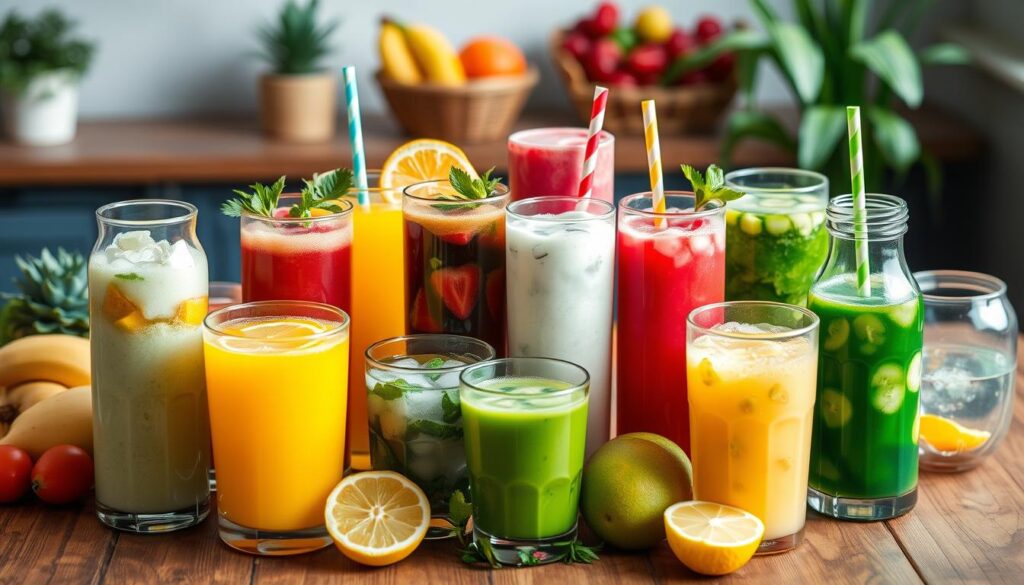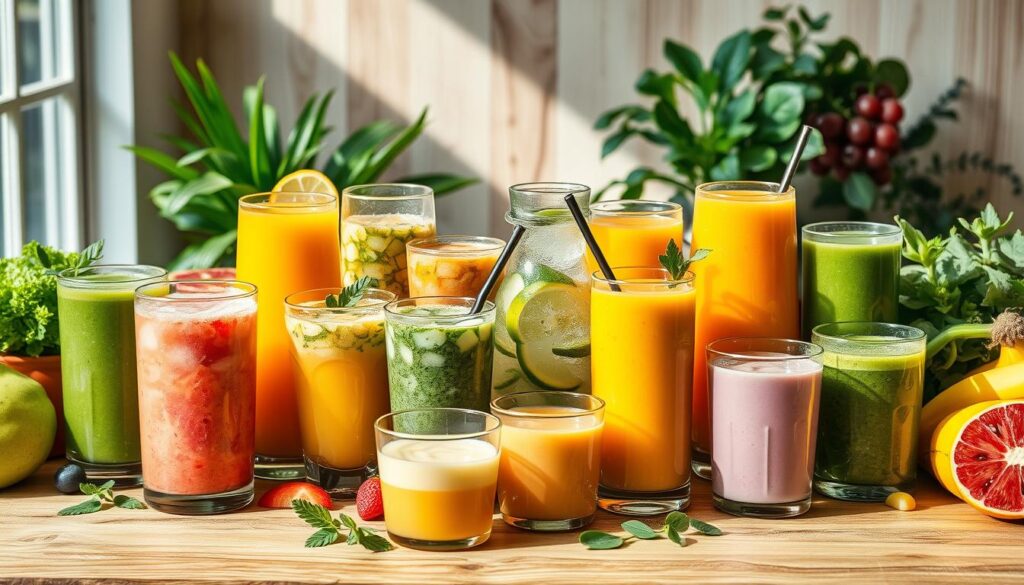Many of us search for ways to manage our weight. We try different strategies to lose weight in a healthy way. I decided to explore water-based diets, which led me to various liquid diets.
Some diets just replace solid foods with liquids. Others suggest drinking only liquids. This journey made me think about the importance of nutrition and how well these diets work.
Let’s dive into my journey. I’ll share what I learned about Meal Replacement Shakes and medically supervised diets. And, of course, the role of water in all of it.
Key Takeaways
- Understanding the potential benefits and risks associated with liquid diets is crucial.
- Hydration plays a fundamental role in all forms of weight loss, including liquid diets.
- It’s essential to evaluate how sustainable water-based diets can contribute to long-term health goals.
- Properly transitioning from a liquid diet back to solid foods is vital to maintain any weight loss achievements.
- Research and consult medical professionals when considering a liquid diet to support weight management.
Introduction to Liquid Diets and Modern Weight Management
Looking into weight loss with liquid diets opens up many discussions. These diets, made of juices, smoothies, and shakes, replace meals. They are known for quick weight loss and have shown to help in losing weight.
Starting a liquid diet journey, I saw why they’re popular. They promise fast weight loss and detox. But, it’s important to know the benefits and make sure you get all the nutrients you need.
The Rise of Liquid Diets in Seeking Weight Loss
Liquid diets have become more popular in recent years. They are easy to use and fit into busy lives. Celebrities and health fans have made them popular, showing how effective they can be.
Potential Health Benefits and Drawbacks of Liquid Nutrition
- Quick Weight Management: Liquid diets have fewer calories than solid meals, helping with weight loss.
- Improved Digestive Rest: They make digestion easier, which can help your gut health.
- Detoxification: Some believe they help clean your body by reducing toxins and increasing nutrient intake.
But, there are downsides to consider. Liquid diets often lack fiber, which can cause constipation. They might also not be good for your gut health in the long run. Also, it’s hard to keep the weight off once you go back to solid foods.
| Aspect | Benefit | Drawback |
|---|---|---|
| Caloric Intake | Lower calories promote weight loss | May not be sustainable long-term |
| Nutritional Balance | Can be fortified with vitamins and minerals | May lack necessary fiber and protein |
| Usability | Convenient and easy to consume | Not suitable for all due to taste and texture preferences |
In conclusion, while liquid diets seem appealing for quick weight loss, they should be approached with care. Weighing the pros and cons and getting advice from nutrition experts can help make them safer and more effective.
Unpacking the Different Types of Liquid Diets for Weight Loss
In my quest to find the best liquid diet plans for weight loss, I’ve looked at many options. Each one meets different health needs and lifestyles. Let’s explore what makes each type effective and how they support long-term health.
Meal Replacement Shakes: Balancing Convenience and Nutrition
Meal replacement shakes are key in healthy liquid diet options. They offer a quick, nutritious meal for those with busy lives. These shakes have vitamins, minerals, and proteins to keep you going without too many calories. They’re great for quick weight loss but not a long-term diet.
Detox Diets and Cleanses: Fact vs. Fiction
Detox diets promise fast weight loss and toxin removal with ingredients like lemon juice and cayenne pepper. But, they often lack important nutrients and aren’t good for long-term health. Our bodies naturally clean themselves through the liver and kidneys. So, while they might help lose weight fast, they’re not healthy for keeping.
Medically Prescribed Liquid Diets for Specific Health Conditions
Some people need a liquid diet for health reasons. These diets are made to meet nutritional needs without solid food. They’re used before surgery or for digestive issues. This includes clear liquids, full liquids, and special shakes to ensure patients get what they need.

Each liquid diet has its own purpose, whether for weight loss, health reasons, or detox. It’s important to know what each diet is for and how it might affect your health. Always talk to a doctor or nutritionist before starting any liquid diet plans for weight loss.
| Diet Type | Purpose | Typical Duration | Nutrient Consideration |
|---|---|---|---|
| Meal Replacement Shakes | Weight loss and convenience | Short-term (1-3 months) | High in protein, vitamins & minerals |
| Detox Diets | Toxin removal and quick weight loss | Very short-term (days to a week) | Low in essential nutrients |
| Medically Prescribed Diets | Medical necessity, pre/post-surgery | Duration as prescribed | Fully controlled and balanced |
Choosing a liquid diet should be a thoughtful decision. It’s best to get advice from a dietitian or nutritionist. This ensures it fits well with your overall health plan.
Exploring Liquid Diets: Water as the Foundation for Sustainable Weight Loss
In my journey to lose weight, water has been key. Using water as the foundation for sustainable weight loss helps me stay hydrated. It also cuts down on calories by replacing drinks high in calories. A liquid diet for health can have very few calories, from 500 to 1,500 a day.
Here’s how drinking lots of water can help manage weight and improve health:
- Hydration Boosts Metabolism: Drinking enough water can make your metabolism faster. This helps burn more calories all day.
- Reduction in Caloric Intake: Drinking water instead of high-calorie drinks lowers your daily calories without feeling deprived.
- Appetite Control: Sometimes, we think we’re hungry when we’re really thirsty. Drinking water helps tell the difference, reducing snacking.
Studies, like the one here, show water-based diets can lead to big weight loss. For those on structured diets, water impacts hunger and metabolism.
“Incorporating water strategically into a liquid diet can redefine the path to weight loss and health sustainability,” a registered dietitian explained during one of the 22 instructional sessions in a comprehensive study.
A strong liquid diet also boosts health by providing important vitamins and minerals without too many calories. Here’s a quick comparison:
| Aspect | Liquid Diet | Solid Food Diet |
|---|---|---|
| Caloric Intake | Low | Variable |
| Nutrient Density | High (with well-formulated products) | Variable |
| Hydration | Excellent (mainly water-based) | Poor |
| Satiety | Depends on fiber content | High (due to bulk) |
| Weight Loss Potential | High | Moderate (depends on food choices) |
Using water as the foundation for sustainable weight loss in a liquid diet has big benefits for weight and health. It’s a journey of mindful eating and lifestyle change. It promises not just a slimmer waist but also a healthier, more hydrated body. As I keep going, the benefits and challenges of this diet guide my choices and shape my health.
Navigating the Calories: The Role of Liquid Diets in Caloric Restriction
Starting a liquid diet was a new chapter in my weight loss journey. Liquid diets focus on eating fewer calories without losing nutrients. By choosing liquids over solids, I cut down on calories but still got the nutrients I need.
How Liquid Meal Replacements Achieve Lower Calorie Intake
Liquid diets are great for controlling calories. They offer a balanced mix of nutrients with fewer calories than solid foods. This helped me lose weight effectively.
Adding water to meals also helps. It makes meals less calorie-dense and keeps me full longer. Studies show that eating foods with less energy can help manage weight.
Transitioning from a Liquid Diet Back to Solid Foods
Going back to solid foods was a big step. I did it slowly to keep losing weight and avoid gaining it back. I planned my meals carefully to keep up the good work.
This careful transition is key for lasting success. It helps keep me full and prevents eating too much.

My experience with liquid diets changed how I see food. It taught me how to manage calories for lasting weight loss. This knowledge makes it easier to stay on track.
| Meal Type | Calories Before | Calories After | % Reduction |
|---|---|---|---|
| Breakfast | 450 | 300 | 33% |
| Lunch | 600 | 400 | 33% |
| Dinner | 700 | 500 | 29% |
Understanding how to control calories and stay full is key. Liquid diets offer a scientific and adaptable way to manage weight. It takes effort, patience, and a smart approach to eating.
Solid Meals vs. Liquid Meals: Understanding the Impact on Weight Loss
The debate between solid and liquid meals often focuses on their effectiveness for weight loss. From my own experience and research, I’ve found that weight loss with liquid diets can lead to quick results. This is mainly because they control calorie intake. But, it’s important to make sure healthy liquid diet options don’t lack essential nutrients.
Liquid meals make it easier to manage calories, a key part of losing weight. They help avoid the confusion of measuring food portions and counting calories. On the other hand, eating solid foods can make us feel fuller and more satisfied. This is important for sticking to a diet over time.
Solid meals usually have more nutrients than liquid ones. This is crucial for staying healthy while eating fewer calories. For example, a balanced solid meal can give us a wide range of fiber, vitamins, and minerals. These are important for our metabolism and overall health.
| Aspect | Solid Meals | Liquid Meals |
|---|---|---|
| Satiety | Higher due to solid textures and chewing required | Lower, may lead to snacking |
| Nutrient Diversity | Higher, can include a variety of food groups | Lower, often limited to specific nutrients |
| Calorie Control | More challenging, requires careful portion control | Easier, as meals are pre-measured |
| Long-term Adherence | More sustainable with varied and enjoyable diets | Less sustainable, may lead to nutrient deficiencies |
To get the most out of weight loss with liquid diets, add high-quality protein and enough fiber. You can also include a single solid meal. Mixing both solid and liquid foods in your diet can help manage weight in a balanced way.
Choosing between solid and liquid meals depends on your lifestyle, health, and weight loss goals. Many people find a mix of both works best. It offers the flexibility of liquid meals and the fullness and nutrition of solid foods. So, combining healthy liquid diet options with solid foods can meet your nutritional needs and preferences, helping with weight management.
Conclusion
Looking back, I see how liquid diets can kickstart weight loss. But, it’s key to remember that lasting weight loss needs a balanced diet and meets our nutritional needs. Losing 5–10% of body weight can greatly improve health, showing the power of steady weight loss.
In the UK, obesity affects nearly one in four adults, costing about £2 billion a year by 2030. But, we need lasting solutions, not quick fixes. My own journey showed that early weight loss is often water, and it takes time and patience to keep losing weight. Moving to solid foods was crucial for keeping the weight off and building healthier habits.
Water is essential for health, affecting metabolism and digestion. My experience highlights the importance of personalized advice from weight loss services. Success comes from a well-planned diet and regular exercise. With the right knowledge, support, and determination, lasting weight loss is achievable.




